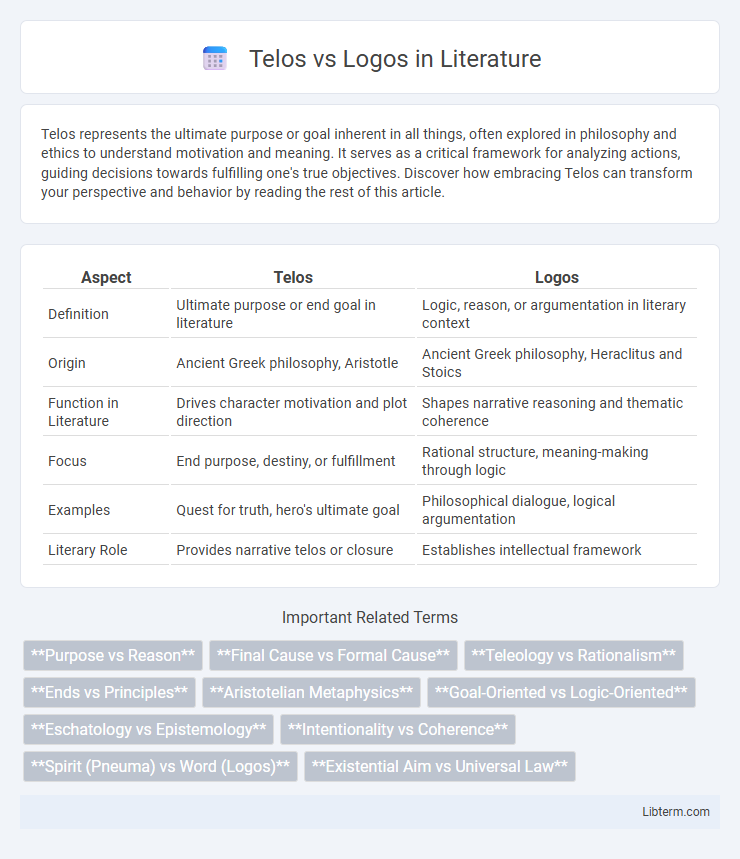Telos represents the ultimate purpose or goal inherent in all things, often explored in philosophy and ethics to understand motivation and meaning. It serves as a critical framework for analyzing actions, guiding decisions towards fulfilling one's true objectives. Discover how embracing Telos can transform your perspective and behavior by reading the rest of this article.
Table of Comparison
| Aspect | Telos | Logos |
|---|---|---|
| Definition | Ultimate purpose or end goal in literature | Logic, reason, or argumentation in literary context |
| Origin | Ancient Greek philosophy, Aristotle | Ancient Greek philosophy, Heraclitus and Stoics |
| Function in Literature | Drives character motivation and plot direction | Shapes narrative reasoning and thematic coherence |
| Focus | End purpose, destiny, or fulfillment | Rational structure, meaning-making through logic |
| Examples | Quest for truth, hero's ultimate goal | Philosophical dialogue, logical argumentation |
| Literary Role | Provides narrative telos or closure | Establishes intellectual framework |
Introduction to Telos and Logos
Telos and Logos represent fundamental concepts in philosophy, with Telos referring to the ultimate purpose or end goal of an entity, and Logos denoting reason, logic, or the underlying principle governing the cosmos and human thought. Telos is commonly associated with Aristotelian philosophy, emphasizing the inherent aim or function that defines the existence and development of living beings and objects. Logos, rooted in ancient Greek thought, especially Stoicism and Heraclitus, signifies the rational order or discourse that explains the nature of reality and guides ethical reasoning.
Defining Telos: Purpose and End Goal
Telos refers to the intrinsic purpose or ultimate end goal that drives the existence or development of an entity, concept, or process. In philosophical terms, it embodies the final cause that explains why something exists or what it aims to achieve. Understanding Telos is essential for grasping the intentionality behind actions, designs, or natural phenomena in contrast to Logos, which centers on reason and logic.
Understanding Logos: Reason and Logic
Logos represents the principle of reason and logical structure in argumentation, guiding coherent thought and clarity in discourse. It is fundamental to classical rhetoric, appealing to the audience's rationality through evidence, facts, and logical connections. Understanding Logos enables critical analysis and effective communication by prioritizing clear reasoning over emotional influence or ethical appeals.
Historical Origins of Telos and Logos
Telos, originating from ancient Greek philosophy, primarily Aristotle's teachings, signifies the ultimate purpose or end goal inherent in all things, emphasizing teleology as the study of purposeful design in nature. Logos, rooted in pre-Socratic philosophy and later Stoicism, represents reason, logic, and the underlying rational principle governing the cosmos and human discourse. Historically, Telos addresses the "why" of existence, while Logos explains the "how" through structured rationality and communicative meaning.
Telos and Logos in Greek Philosophy
Telos in Greek philosophy refers to the intrinsic purpose or ultimate goal that drives the existence and function of an entity, often linked to Aristotle's concept of final causality. Logos, on the other hand, signifies reason, rationality, or the principle of order and knowledge governing the cosmos, prominently explored in Stoic and Heraclitean thought. Understanding the distinction highlights how Telos emphasizes purposeful ends while Logos centers on logical structures and universal reason.
Key Differences Between Telos and Logos
Telos refers to the inherent purpose or ultimate goal of an object or action, emphasizing final causes in philosophical contexts, while Logos denotes reason, logic, or discourse underpinning understanding and communication. Telos is primarily concerned with the end or fulfillment of a process, whereas Logos centers on rational principles and evidence guiding thought or argumentation. Key differences include Telos's focus on outcome and objective versus Logos's emphasis on rationality, explanation, and meaningful expression.
How Telos and Logos Influence Modern Thought
Telos, representing ultimate purpose or goal, and Logos, embodying reason and logic, jointly shape contemporary philosophy by guiding ethical frameworks and rational discourse. Modern thought leverages Telos to define meaning and direction in human activities, while Logos underpins scientific methodology and critical thinking. Their interplay fosters a balanced approach to understanding existence, aligning purposeful objectives with coherent, evidence-based reasoning.
Practical Applications of Telos and Logos
Telos, emphasizing purpose-driven actions, guides ethical decision-making in fields like philosophy, psychology, and organizational leadership, fostering goal-oriented behavior and long-term fulfillment. Logos, rooted in logic and reason, underpins scientific inquiry, critical thinking, and rhetoric, enhancing problem-solving and effective communication across disciplines. Practical applications of Telos align actions with ultimate ends, while Logos structures arguments and analyses to support evidence-based conclusions.
Telos vs Logos in Ethics and Morality
Telos and Logos represent distinct frameworks in ethics and morality, with Telos emphasizing purposeful ends or ultimate goals guiding virtuous behavior, while Logos centers on reason and rational principles governing moral decisions. Ethical theories rooted in Telos prioritize achieving eudaimonia, often linked to Aristotelian virtue ethics, whereas Logos-based ethics align with Stoicism and Kantian deontology, stressing logical consistency in moral laws. Understanding the interplay between Telos as goal-oriented virtue and Logos as rationality-driven duty offers a comprehensive approach to moral philosophy.
Conclusion: Integrating Telos and Logos
Integrating telos and logos enhances strategic decision-making by aligning purposeful goals with logical analysis, fostering balanced leadership. Telos-driven vision provides direction, while logos ensures rational execution, creating a synergy that optimizes outcomes in business and personal development. Embracing both concepts cultivates sustainable success through meaningful objectives grounded in sound reasoning.
Telos Infographic

 libterm.com
libterm.com